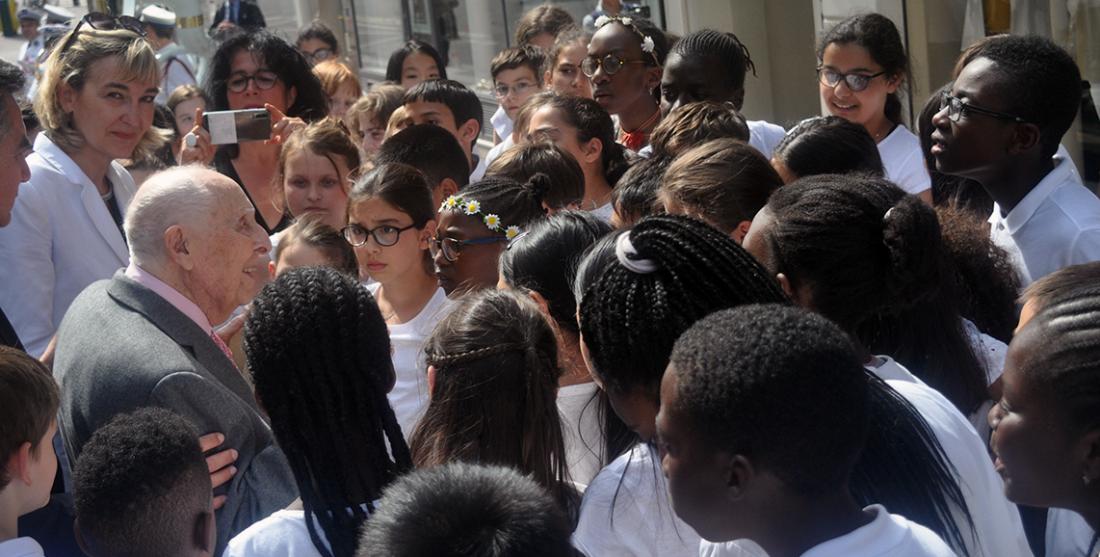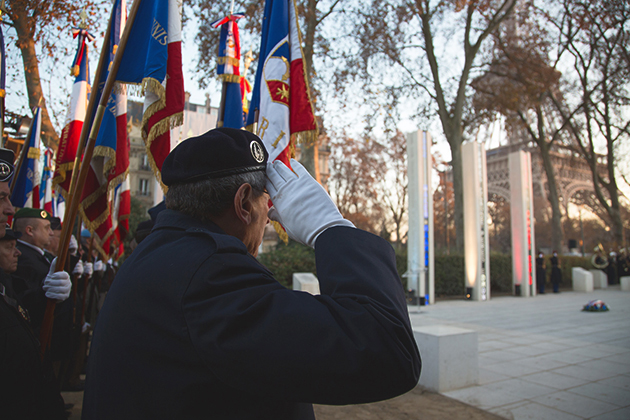The future of the national holidays

In France, no fewer than 11 national holidays, instituted by laws or regulations dating back to 1922, today punctuate the commemorative calendar of the Ministry of the Armed Forces. French people are sometimes puzzled by this situation. But the challenge of future commemorations is not so much about the number of ceremonies as what messages they convey.
Is there something characteristically French about these remembrance events? Today, the national holidays organised by the Ministry of the Armed Forces Directorate for Heritage, Remembrance and Archives (DPMA) commemorate three distinct types of event: the end of conflicts (victory or defeat), the victory of the Nation over an “existential” threat (victory of the rule of law in the First World War on 11 November, victory over Nazi barbarity on 8 May), and martyrdom or sacrifice (Deportation Day on the last Sunday in April, tribute to the harkis on 25 September).
Instituting a single commemorative day would make it difficult to identify these three objectives. In any case, most of our foreign partners do not have a single date (the UK has six; Italy, the United States, Germany and Russia have three apiece). Above all, the disappearance of these specific national holidays would not be well received by veterans’ associations, without whose endorsement any change in the commemorative calendar would be unthinkable.
The challenge for the coming years is rather that of overhauling the Ministry of the Armed Forces’ commemorative policy. While public interest in the periods for which there are no longer any surviving direct witnesses may have been confirmed at the First World War centenary, the goals set for remembrance policy by the White paper on defence and national security of 2013 require changes in the themes commemorated, in order to emphasise: the passing on of the values of the Republic, the honouring of sacrifice, the value of commitment, national unity, and also shared remembrance between France and other countries.
Meanwhile, as surviving veterans of contemporary conflicts become fewer, a remembrance vacuum is progressively created, which it is important to compensate for by fostering a desire in the younger generation to be “bearers of memory”. It is therefore essential to use the latest tools available for remembrance, such as digital technology, where young people seek out information today. That is precisely what the DPMA has done during lockdown, expanding the educational resources available on the “Chemins de Mémoire” website and launching, in partnership with the education ministry, a call for contributions on the theme of 1940.
As regards protagonists and witnesses, an increasingly important place will be taken in the coming years by the veterans of overseas operations, conflicts about which little is known by the public. The common lineage between past veterans, fighting in often horrific mass conflicts, and those engaged in peacekeeping operations or in combating terrorist groups is by no means a given. It is important to support initiatives centred on this latest generation of servicemen and women, whose members are set to become the key protagonists of commemorations in future years.
The historical information that accompanies the commemorations also needs to be reinforced. The large-scale remembrance events need to make way for scientific (seminars, debates, round tables, etc.) and digital formats. This has been seen in 2020, with the launch of two web series on the Franco-Prussian War and the fighting of 1940.
The recent period has demonstrated the DPMA’s ability to adapt to the health crisis, adopting a restricted format for the ceremonies of 19 March, 24 April, 8 May, 8 June and 18 June, backed up by digital resources on the “Chemins de Mémoire” website. On 19 July, the national day of remembrance of the Vel d’Hiv roundup and in honour of the Righteous of France, for the first time ever the ceremony was broadcast live on the ministry’s YouTube channel, via its websites and social media.
Thus, it is up to the State to maintain its commemorative policy, whatever the context, striking a balance so that each past event is remembered and passed on equitably, in a way that is in keeping with the key republican principle of equality.
The editiorial team
Spotlight on the Algerian War – One conflict: three dates

National ceremony of 5 December 2016, Quai Branly memorial, Paris. © A.Thomas-Trophime/DICoD
It is characteristic of the Algerian War that it still divides society along the idealogical lines of the time. The fact that there are three dates for a single conflict illustrates the complexity of how the war in Algeria is perceived and remembered by the French population today.
25 September
After a first ceremony presided over by President Jacques Chirac on 25 September 2001 at Les Invalides, the Decree of 31 March 2003 instituted this date in recognition of the sacrifices made for France by the harkis and other members of the auxiliary forces. Its purpose was to give form to the reality of the commitment made to their country by large numbers of French Muslims and their families, who became dual victims of Algerian independence, given the fate that awaited them both in Algeria (acts of violence, torture, murder, disappearances and discrimination) and in France (official refusal to receive them, precarious living conditions, holding camps).
5 December
Instituted by Decree No 2003-925 of 26 September 2003 as a national day of remembrance of those who died for France during the Algerian War and the fighting in Morocco and Tunisia, 5 December corresponds to the date of inauguration of the monument on Quai Branly, Paris, in 2002. The choice of this date, put forward by the Favier Commission, may have been arbitrary, but it avoided a single event from being chosen which could potentially attract criticism from one side or the other.
19 March
Planned since 2002 and passed by the French parliament but cautiously shelved, Law No 2012-1361 of 6 December 2012 made 19 March a national day of remembrance and contemplation in memory of the civilian and military victims. 19 March 1962 was the date the Évian Accords declaring a ceasefire, signed the previous day, came into force, although it was followed by a series of tragic events for the harkis and the repatriated, such as the Oran Massacre of 5 July. For most metropolitan French people, it was the end of French military operations and therefore the conscripts’ homecoming. Yet for the Algerian French, 19 March was not the end of the war. Three commemorative dates therefore remain for the Algerian War. But it is not a case of prolonging the conflict through an ongoing war over remembrance. Like 11 November, which honours all those who died for France, these dates of commemoration bring a time for contemplation and unity around remembrance. Today, memories of the Algerian War are plural. It is important to work towards their harmonious inclusion in the French narrative.
Foundation for Remembrance of the Algerian War and the Fighting in Morocco and Tunisia
Commemorative sites
- National Memorial to the Algerian War and the Battles in Morocco and Tunisia
- Mémorial des Martyrs de la Déportation
- Arc de Triomphe
- Indochina War Memorials
- Memorial of France Combattante
- CERCIL - Musée Mémorial des enfants du Vel d’Hiv
- Hôtel des Invalides - The Army Museum
- Memorial to French soldiers killed in overseas operations

